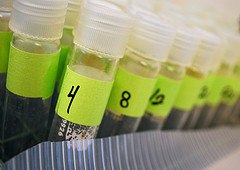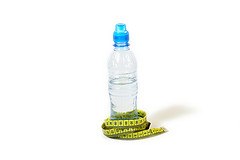Drinking water in the United States is regulated by a law called the Safe Drinking Water Act. With this law in place, many homeowners wonder why water in the Carolinas still suffers from quality issues. So today we’re going to talk about what the Safe Drinking Water Act is and the limitations of the law…
What are Trihalomethanes in Water and How Do They Affect Our Health?
Prior to the 1900’s, much of the drinking water in the United States was at a high risk for containing dangerous pathogens that were responsible for various life-threatening illnesses. This threat was nearly eliminated with the advent of using chlorine as a disinfectant in public water supplies. Although chlorinating drinking water has proven to be…
How Clean, Filtered Water Can Help Encourage Weight Loss
There are many different diets out there, and people will offer all sorts of different (and often conflicting) advice about how to lose weight. But one thing that is common in almost any type of weight loss plan is the suggestion to drink more water. This isn’t always easy to do, but it becomes much…
Free Water Quality Testing for North and South Carolina Homes
The water in North and South Carolina can get contaminated in all kinds of ways. The type and severity of your home’s water contamination levels can depend on a number of different factors, which is why you should have your water tested in order to understand what’s in it. Today we’re going to talk about…
How Do Shower Water Contaminants Affect Our Health and Our Homes?
Did you know that some water contaminants are more dangerous to our health when we breathe them in than they are when we drink them? This makes water quality an important issue not just for our drinking water, but also for the water that we use for showering. Today we’re going to talk about why…
Can a Water Softener Remove Iron from the Tap Water in your North or South Carolina Home?
Water softeners serve a specific purpose: they remove hardness minerals from your tap water. But as it turns out, the ion exchange process that's used by water softeners can also remove traces of a few other types of water contaminants, including iron. Today we're going to talk about whether or not a water softener alone…
Can Drinking Unfiltered Tap Water Increase a Child’s Risk of Developing Food Allergies?
According to the CDC, "The number of young people who had a food or digestive allergy increased 18 percent between 1997 and 2007." This is a dramatic rise that has continued in the years following this report. A recent study suggests that one of the possible explanations for the increase in food allergies is a…
What are the Effects of Chlorine in our Drinking Water?
Chlorine has been used as a disinfectant by water treatment plants for a long time, but there has been a growing concern in recent years about the consequences of consuming the chemical and its byproducts. Today we’re going to talk about the health effects of chlorine in our drinking water and what you can do…
Is There a Connection Between Tap Water Quality and Autism?
For the past few decades, the amount of children who have been diagnosed with autism has risen dramatically. Between 2000 and 2010 alone, the prevalence of the developmental disorder rose from 1 in every 150 children to 1 in every 68 children. According to some scientists, one of the contributing factors to this increase is…





